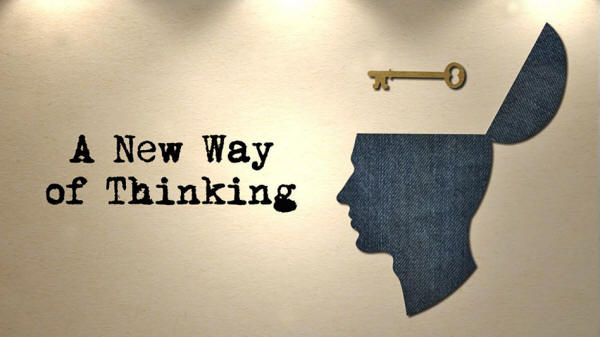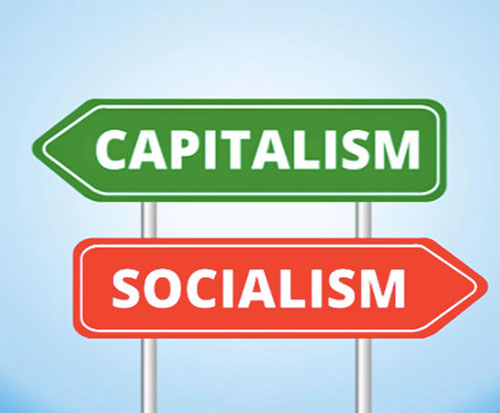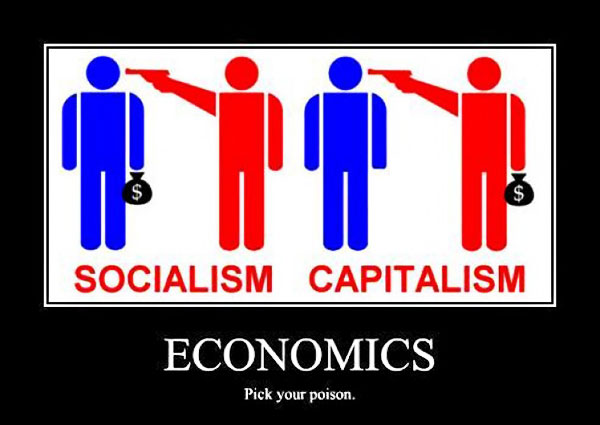|

by Charles Hugh Smith
May 01, 2018
from
CharlesHughSmith Website

The
status quo, in all its various
forms, is dominated by incentives that strengthen the centralization
of wealth and power.
As longtime readers know, my work aims to,
-
explain why the
status quo - the socio-economic-political system we inhabit
- is unsustainable, divisive, and
doomed to collapse under
its own weight
-
sketch out an
alternative Mode of Production/way of living that is
sustainable, consumes far less resources while providing for
the needs of the human populace - not just for our material
daily bread but for positive social roles, purpose, hope,
meaning and opportunity, needs that are by and large ignored
or marginalized in the current system.
One cognitive/emotional
roadblock I encounter is the nearly universal assumption that
there are 'only' two systems:
This divide plays out
politically as,
-
the Right
(capitalism, favoring markets)
-
the Left
(socialism, favoring the state)

Everything from Communism
to Libertarianism can be placed on this spectrum.
But,
The roadblock here is
adherents to one camp or the other are emotionally attached to their
ideological choice, to the point that these ideological attachments
have a quasi-religious character.
Believers in the market as the solution to virtually any problem
refuse to accept any limits on the market's efficacy, and believers
in greater state power/control refuse to accept any limits on the
state's efficacy.
I often feel like I've been transported back to the
30 Years War between Catholics
and Protestants in the 1600s. I've written numerous books that
(in part) cover the inherent limits of markets and the state, so
I'll keep this brief.
Markets are based on two
premises:
-
profits are the
key motivator of human activity
-
whatever is
scarce can be replaced by something that is abundant (for
example, when we've wiped out all the wild Bluefin tuna, we
can substitute farmed catfish)
But what about work that
creates value but isn't profitable? This simply doesn't
compute in the market mentality.
Neither does the fact that wiping
out the wild fisheries disrupts an ecosystem that is essentially
impossible to value in terms that markets understand:
in a market, the
supply and the demand in this moment set the price and thus the
value of everything.
But ecosystems simply
cannot be valued by the price set in the moment by current supply
and demand.
As for the state, its ontological imperative is to concentrate
power, and since wealth is power, this means concentrating political
and financial power. Once bureaucracies have concentrated power,
insiders focus on securing budgets and benefits, and limiting
transparency and accountability, as these endanger the insiders'
power, security and perquisites.
Both of these systems share a single quasi-religious ideology:
a
belief that endless economic growth is an intrinsic good, for it is
the ultimate foundation of all human prosperity.
In other words, we can
only prosper and become more secure if we're consuming more of
everything:
resources, credit, energy, and so on.
The second shared ideological faith is that centralizing wealth and
power are not just inevitable but good.
In other words, Left and
Right share a single quasi-religious belief that centralization is
not just inevitable but positive:
the only difference is in who
should hold the concentrated wealth/power, private owners or the
state.
This ideology assumes a winner take most structure of winners and
losers, with the winnings being concentrated in the hands of a few
at the top of the Winners.
Thus rising inequality
and divisiveness are assumed to be the 'natural' state of any economy.
This ideology underpins the entire status quo spectrum. The "growth
at any cost is good" part of the single ideology underpinning the
status quo is captured by the 1960 Soviet-era film
Letter Never
Sent.
In its haunting, surreal
final scene, a character envisions a grand wilderness untouched by
human hands transformed into an industrial wasteland of belching
chimneys and sprawling factories.
This was not a nightmare
- this was the Soviet dream, and indeed, the dream of the "growth at
any cost is good" West.
Simply put, the status quo of markets and states is incapable of
DeGrowth, i.e. consuming less of everything, including credit,
"money", profits, taxes - everything that fuels both the state and
the market.
As I have taken pains to explain, it doesn't matter if a
factory is owned by private owners or the state: the mandate of
capital is to grow. If capital doesn't grow,
the resulting losses will sink the enterprise - including the state
itself.
What lies beyond "growth at any cost" capitalism and socialism?
My
answer is the
self-funded community economy, a system that is
self-funded (i.e. no need for a central bank or Treasury) with a
digital currency that is created and distributed for the sole
purpose of funding work that addresses scarcities in local
communities.
I outline this system in 'A
Radiocally Beneficial World - Automation, Technology and Creating
Jobs for All.'
Rather than concentrate power in the hands of state insiders, this
system distributes power to communities are participants. Rather
than concentrate the power to create currency for the benefit of
banks and the state, this system distributes the power to create
currency for the sole benefit of those working on behalf of the
community, on projects prioritized by the community.
This community economy recognizes that some work is valuable but not
profitable.
The profit-driven market
will never do this work, and the central state is (to use Peter Drucker's term) the wrong unit size to ascertain each community's
needs and scarcities.
Clearly, we need a socio-economic-political system that has the
structure to not just grasp the necessity of DeGrowth and positive
social roles (work benefiting the greater community) but to embrace
these goals as its raison d'etre (reason to exist).
Human activity is largely guided by incentives, both chemical
incentives in our brains and incentives presented by the
society/economy we inhabit.
In the current system,
concentrating power and wealth in the hands of the few at the
expense of the many and wasting resources/destroying ecosystems are
incentivized if the activity is profitable to some enterprise or
deemed necessary by the state.
In the current system, the state incentivizes protecting its wealth
and power and the security/benefits of its insiders, and markets
incentivize maximizing profits by any means available.
As I have explained, we inhabit
a state-cartel economy:
the most profitable form of enterprise is
the quasi-monopoly or cartel that limits supply and competition in
order to extract the maximum profit from its customers.
Monopolies (or quasi-monopolies
such as Google, which holds a
majority share of global search revenues, excluding China) and
cartels quickly amass profits which they then use to secure
protection of their cartel from the state via lobbying, campaign
contributions, etc.
The elites controlling
the state benefit from this arrangement, and so the system
inevitably becomes a state-cartel system dominated by the state and
private sector cartels and incentives that benefit the wealth and
power of these institutions.

Once we understand the inevitability of this marriage of state and
cartel, we understand socialism and capitalism - the State and
Markets - are the yin and yang of one system.
Reformers may recognize
some of the inherent limits of the state and the market, but they
believe these problems can be solved by tweaking policies - in
systems-speak, modifying the parameters of the existing subsystems
of lawmaking, the judiciary, regulatory agencies, and so on.
But as Donella Meadows explained in her classic paper, 'Leverage
Points - Places to Intervene in a System' tweaking the
parameters doesn't actually change the system.
For that, we must add a
new feedback loop...
The status quo, in all its various forms, is dominated by incentives
that strengthen the centralization of wealth and power, increase
inequality and divisiveness and the permanent expansion of
consumption and credit.
That this path leads to
implosion/collapse does not compute because the status quo is
constructed on the fundamental assumption that permanent
growth/expansion of consumption, credit, wealth and state power is
not just possible but necessary.
As many of us have labored to show, the financial system has been
pushed to unprecedented extremes to maintain the illusion that rapid
growth of consumption and credit can be maintained essentially
forever.
We need
an alternative system that's built on sustainable incentives
and feedback loops so we have a new blueprint to follow as the
current arrangement unravels in the next decade or two.
Security and prosperity are worthy goals, but the means to achieve
them, as well as the definition of security/prosperity, must be
reworked from the ground up.
We need to include positive social
roles and meaningful work as essential components of
security/prosperity.
My conception of a Third/Community Economy does not replace either
the state or the free-enterprise market; rather, it does what
neither of the existing structures can do.
It adds opportunity,
purpose, positive social roles and earned income for those left out
of the state/cartel/market economy...
|




